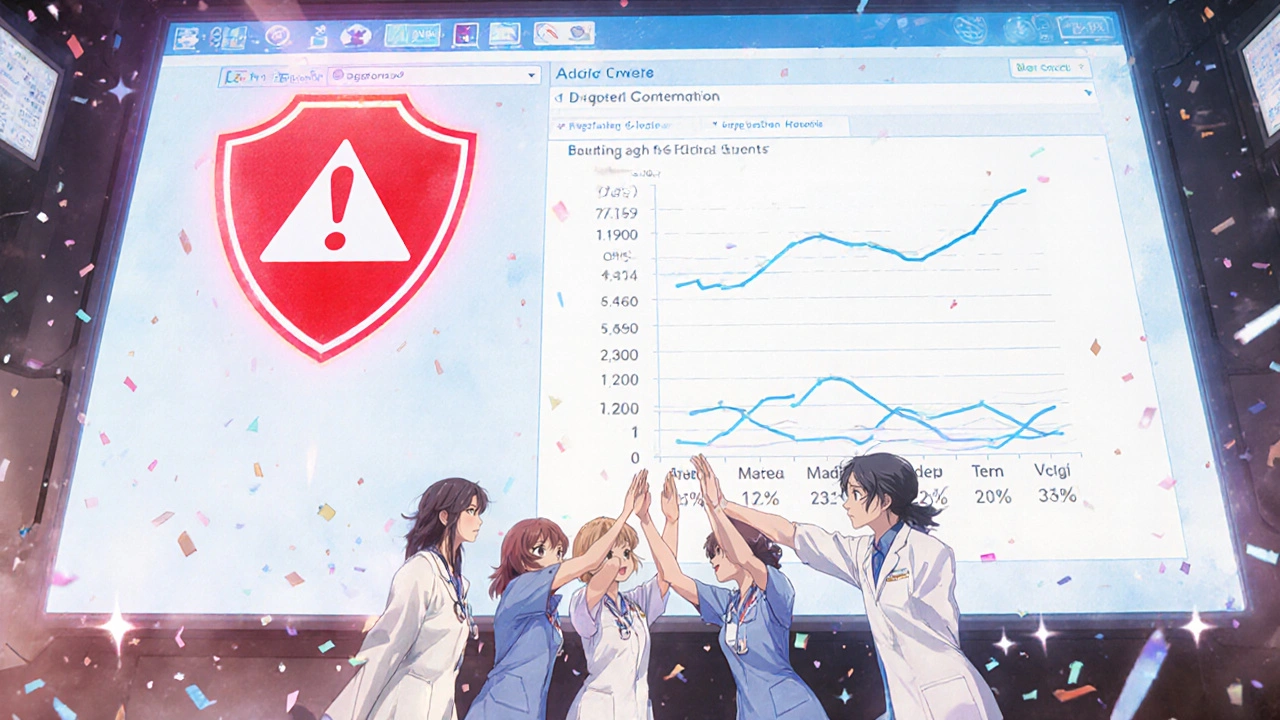
Dofetilide-Cimetidine Interaction Checker
Check for Dangerous Interaction
This tool helps identify the deadly interaction between dofetilide (Tikosyn) and cimetidine (Tagamet). When taken together, cimetidine can increase dofetilide levels by 50-100% within 24 hours, significantly raising the risk of life-threatening heart rhythms.
Safe Alternatives for Heartburn
Patients on dofetilide should use these alternatives instead of cimetidine:
- Famotidine (Pepcid): Up to 40 mg twice daily
- Omeprazole/Esomeprazole: 20 mg daily
- Rabeprazole/Pantoprazole: Equally safe alternatives
Note: Famotidine and PPIs do NOT interfere with dofetilide elimination
Two medications - one for irregular heartbeat, another for heartburn - might seem harmless together. But when dofetilide and cimetidine are taken at the same time, the risk of sudden, life-threatening heart rhythms spikes dramatically. This isn’t a theoretical concern. It’s a well-documented, preventable killer that still catches doctors and patients off guard - even in 2025.
What Dofetilide Does - and Why It’s So Sensitive
Dofetilide, sold under the brand name Tikosyn, is a powerful drug used to reset and maintain a normal heart rhythm in people with atrial fibrillation or atrial flutter. It works by blocking specific electrical channels in heart cells, which helps stabilize the rhythm. But here’s the catch: it has an extremely narrow safety window. Too little, and it doesn’t work. Too much, and it can trigger a chaotic, deadly heart rhythm called torsades de pointes.
This drug is eliminated almost entirely by the kidneys - about 80% of it leaves the body unchanged through a specialized transport system called the renal cation exchange pathway. That’s why doctors carefully adjust the dose based on kidney function. If your creatinine clearance drops below 20 mL/min, dofetilide is outright banned. But even if your kidneys are fine, another drug can sabotage this system - and cimetidine is the worst offender.
Why Cimetidine Is the Problem - Not Other Heartburn Drugs
Cimetidine, sold as Tagamet, is an older H2 blocker used to reduce stomach acid. It was once one of the most popular heartburn meds in the world. But unlike newer alternatives like famotidine (Pepcid) or proton pump inhibitors like omeprazole, cimetidine doesn’t just calm stomach acid - it also blocks the exact kidney transport system that removes dofetilide.
Studies show that when cimetidine is taken with dofetilide, plasma levels of dofetilide jump by 50% to 100% within just 24 hours. That’s not a small bump. That’s enough to push a patient from safe to dangerous territory in a single day. The FDA-approved prescribing information for Tikosyn confirms this: the risk of dangerous QT prolongation rises from 3-5% with dofetilide alone to 12-18% when cimetidine is added.
Other H2 blockers? No problem. Famotidine doesn’t interfere with the renal transporter. Ranitidine (even though it’s mostly off the market now) didn’t either. But cimetidine? It’s uniquely dangerous. It’s not just a mild interaction - it’s a Level 1 contraindication on the Hemiya Drug Interaction Severity Scale, the highest risk category possible.

The Real Danger: Torsades de Pointes
QT prolongation sounds technical, but what it means is simple: the heart takes too long to recharge between beats. That delay creates an electrical instability that can spiral into torsades de pointes - a type of ventricular tachycardia that looks like a twisting pattern on an ECG. It often causes dizziness, fainting, or sudden cardiac arrest.
Case reports are chilling. One 72-year-old man on stable dofetilide started cimetidine for heartburn. Three days later, he went into torsades de pointes and needed emergency cardioversion. Another 65-year-old woman took a single 300 mg dose of cimetidine for an upset stomach and collapsed with polymorphic ventricular tachycardia. Both survived - but barely.
The FDA’s Adverse Event Reporting System recorded 87 cases of QT prolongation and 23 cases of torsades de pointes directly linked to this combo between 2010 and 2022. That’s a 3.2-fold increase over what’s expected. And these are just the reported cases. Many more likely go unreported or misdiagnosed.
Who’s at Risk - And Why It’s Still Happening
You might think this interaction is a relic of the 1990s. But it’s not. Older adults, especially those in nursing homes or hospitals, are still being prescribed cimetidine. Why? Because it’s cheap. Because someone remembers it from decades ago. Because the EHR alert got missed.
Patients with atrial fibrillation are already on multiple medications - an average of nearly seven. Add cimetidine for a temporary stomach issue, and the risk compounds. Low potassium levels (below 3.6 mmol/L) make things even worse. Many patients on diuretics for heart failure are already borderline low on potassium. Throw in cimetidine, and the electrical system becomes a ticking bomb.
Surveys from 47 academic medical centers show that 12-15% of unexpected torsades cases in dofetilide patients involve unrecognized cimetidine use. That’s not rare. That’s systemic.

What Should Be Done - And What’s Already Being Done
The fix is simple: never combine them. Period.
Before starting dofetilide, doctors must check for cimetidine use - and not just ask the patient. They need to review every prescription, OTC med, and supplement. The American College of Cardiology and European Heart Rhythm Association both say this combination is never appropriate. The 2023 Beers Criteria for Older Adults lists it as one of the most dangerous drug pairs for seniors.
Good hospitals now have automated systems that block the combination. Epic and Cerner EHRs require a cardiologist to override the warning - and even then, it’s logged and reviewed. Since 2015, inappropriate prescribing has dropped from 8.7% to just 1.2% thanks to these alerts.
For patients who need acid suppression, the alternatives are safe and effective:
- Famotidine (Pepcid) - up to 40 mg twice daily
- Omeprazole or esomeprazole (PPIs) - 20 mg daily
- Rabeprazole or pantoprazole - equally safe
If cimetidine is absolutely unavoidable - say, for acute GI bleeding - dofetilide must be stopped for at least 10 days (five half-lives), and the patient’s QT interval must be monitored closely before restarting.
The Bigger Picture: Why This Matters Beyond Two Drugs
This isn’t just about dofetilide and cimetidine. It’s about how easily a small, overlooked interaction can kill. It’s about how outdated medications linger in practice despite better options. It’s about the silent burden of polypharmacy in aging populations.
With over 6 million Americans living with atrial fibrillation, and many of them on multiple drugs, these hidden interactions are a quiet epidemic. Every avoided dofetilide-cimetidine interaction saves an estimated $47,500 in emergency care, ICU stays, and long-term complications.
Cardiology leaders call this interaction a “systems failure.” It shouldn’t happen in 2025. We have the tools: electronic alerts, AI predictors, clear guidelines, safe alternatives. The only thing missing is vigilance.
Patients: if you’re on dofetilide, don’t take any new medication - even over-the-counter ones - without checking with your cardiologist. Cimetidine might be on the shelf, but it doesn’t belong in your medicine cabinet if you’re on this drug.
Doctors: if you see cimetidine on a list for a patient on dofetilide, stop. Don’t assume it’s harmless. Don’t assume the patient knows. Don’t assume the system caught it. Confirm. Switch. Document. Save a life.
Can I take famotidine instead of cimetidine while on dofetilide?
Yes, famotidine (Pepcid) is a safe alternative. Unlike cimetidine, it does not block the kidney transporter that removes dofetilide. Studies show no significant increase in dofetilide levels when taken with famotidine. You can use famotidine at standard doses (up to 40 mg twice daily) without increasing arrhythmia risk.
How quickly can cimetidine raise dofetilide levels?
Dofetilide levels can rise by 50-100% within 24 hours of starting cimetidine. This rapid increase is why even short-term use - like taking it for two days for heartburn - can trigger torsades de pointes. There is no safe window for combining these drugs.
Is this interaction only dangerous in older adults?
No. While older adults are at higher risk due to reduced kidney function and polypharmacy, this interaction can be deadly at any age. The mechanism - renal transport inhibition - affects anyone taking both drugs, regardless of age. Case reports include patients in their 40s and 50s.
What should I do if I accidentally took cimetidine while on dofetilide?
Stop cimetidine immediately. Contact your cardiologist or go to the nearest emergency room. You may need an ECG to check your QT interval. Do not wait for symptoms. Torsades de pointes can strike suddenly. Even if you feel fine, the risk is still elevated for at least 48-72 hours after taking cimetidine.
Are there any other drugs that interact with dofetilide like cimetidine does?
Yes. Other drugs that inhibit the same kidney transporter can also raise dofetilide levels, including verapamil, trimethoprim (in Bactrim), and ketoconazole. These combinations are also contraindicated or require extreme caution. Always review all medications - including antibiotics and antifungals - before starting dofetilide.
Why hasn’t cimetidine been pulled from the market if it’s so dangerous?
Cimetidine is still available because it’s inexpensive and effective for its intended use - reducing stomach acid. The danger lies only in its interaction with specific drugs like dofetilide. It’s not the drug itself that’s unsafe, but its combination with others. The solution is better prescribing practices, EHR alerts, and patient education - not removal from the market.
swatantra kumar
November 20, 2025 AT 01:30Nick Naylor
November 20, 2025 AT 11:34Brianna Groleau
November 20, 2025 AT 21:25Rusty Thomas
November 22, 2025 AT 12:00Sarah Swiatek
November 24, 2025 AT 07:25Dave Wooldridge
November 24, 2025 AT 15:30Rebecca Cosenza
November 25, 2025 AT 08:00Cinkoon Marketing
November 25, 2025 AT 22:31robert cardy solano
November 27, 2025 AT 20:25Pawan Jamwal
November 27, 2025 AT 21:47Bill Camp
November 29, 2025 AT 09:58